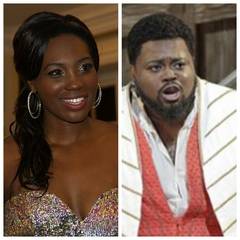|
Back
When the Bard Begins to Sing New York
Isaac Stern Auditorium, Carnegie Hall
06/22/2023 - & June 27, 2023 (Paris)
Leonard Bernstein: Symphonic Dances from West Side Story
Matthew Aucoin: Heath (King Lear Sketches) (World Premiere)
Tchaikovsky: Romeo and Juliet Fantasy Overture
Giuseppe Verdi: Act IV from Otello
Angel Blue (Desdemona), Russell Thomas (Otello), Deborah Nansteel (Emilia), Errin Duane Brooks (Cassio), Michael Chioldi (Jago), Richard Bernstein (Lodovico), Adam Lau (Montano)
The Met Orchestra, Yannick Nézet‑Séguin (Music Director, Conductor)

M. Aucoin/Y. Nézet‑Séguin
“Who can’t relate to being loved or loving somebody? Who can’t relate to death or losing someone they love? Who can’t relate to war, especially today? Anyone can relate to these things. That’s what makes opera accessible.”
Russell Thomas
“Giuseppe Verdi (to librettist Arrigo Boito): “Poor Othello!... He won’t come back here any more!!!”; Boito:(to composer Verdi) “The Moor will come back though no more to knock on your Genoa door. But you will go to meet the Moor at La Scala. Otello exists. The great dream has become reality.”
Yannick Nézet‑Séguin could have faced his Carnegie Hall audience last night and commanded them (in Cole Porter’s words), to “Brush up your Shakespeare/Start quoting it now....” After all, we were to be treated in a couple of hours to a pair of Romeos and Juliets, three movements of Lear, and a good helping of Otello (a.k.a. Othello).
What held them together was, yes, the Bard and his composers. But more assuredly, Met Orchestra Music Director Yannick Nézet‑Séguin himself. He is not a showy conductor of the Bernstein legacy. But one could have deleted the notes, to watch him dance, sway, cue, and obviously love his music.
The Met Orchestra itself, while hardly perfect (some bad blats from the brass) had an electric response to Mr. Nézet‑Séguin. And Mr. Nézet‑Séguin responded with four exceedingly different genres to the four works.
Third, he took two all‑too familiar readings of the too‑familiar Romeo/Juliets and made this writer see them in a different light and (gulp, blush) love Tchaikovsky’s piece once again after all these years.
That fresh reading came with Leonard Bernstein’s Symphonic Dances from “West Side Story”. With the emphasis on the word “symphonic”.
West Side Story itself is so multi‑layered that Bernstein’s music became (as it should be) merely part of the production. In the show, we had a smorgasbord of dance and drama, words and singing, sets and violence. Bernstein’s music is fabulous, it transcends show‑biz. But is still part of the mise en scène.
Listening to Mr. Nézet‑Séguin, one expects and hears those dynamic Caribbean/jazzy rhythms, those explosive drums. Yet for the first time, I realized that Bernstein had written an atonal score.
No, not 12‑tone, about which the composer has condescending contempt. Instead, Bernstein had produced phrases, melodies, modulations which had no right to be in a Broadway show, which were rescued by the Sondheim libretto. Here, Mr. Nézet‑Séguin brought out tunes which could have been written by Varèse, harmonies that could easily been penned by Berg. In fact, it seemed far more inventive than Bernstein’s “serious” works.
Not that I’m implying that the composer, like Gershwin, should have stuck with the stage. Only that this performance radiated his genius in a singular manner.
Obviously, I was not keen on hearing the “other” Romeo and Juliet, but Mr. Nézet‑Séguin offered the old warhorse immense tension in the buildup–and savagery in the fight scene. Nor did he disguise the drippy love scene. It was, as always, maudlin, a bit cheesy, but here suitably eloquent.
The one new work was Matthew Aucoin’s short (11 minutes), connected episodic Heath (King Lear Sketches).
Now first of all, no composer should ever try to offer a musical picture of Shakespeare’s original. It can’t be done. Next, Mr. Aucoin gave it a good try. The first section, “The Heath”, was an atmospheric picture of the remote last scene of the play. The tolling of bells, the vacuous bird sounds, the heavy orchestral undertone...well, this was the twin brother (not the clone) of Britten’s first Sea Interlude. The second two sections were not as striking. The end, a kind of cortege with soft horns and brasses, was effective enough.
A suggestion to Mr. Aucoin. The only film which comes close to Shakespeare’s Lear was Kurosawa’s Ran. I may be wrong, but I can’t remember any background music. Perhaps...just perhaps...Mr. Aucoin might be able to place some of his music somewhere in that so stark film.

A. Blue/R. Thomas (© Dario Acosta/Corey Weaver-San Francisco Opera)
The second half of the program was devoted to Act IV of Verdi’s most endlessly aggressive (though not so in Act IV), most emotional opera, Otello. As a stagework or even a film (Zeffirelli’s fabulous production), this is the best of theater. In this non‑staged performance, Otello obviously loses much of its impact. Yet with the right voices, and the English sur‑titles, it can still impress and move an audience.
In this case, it was Angel Blue’s Desdemona that was a most original performance. Yes, her voice is lilting, as pure as expected, with no mannerisms, no undue operatic poise for her “Willow Song” or “Ave Maria.” She could have sung both with staged fervor, even excitement. Instead, Ms. Blue sung simply, even classically. Yes, this was Verdi, but she could have been singing Mozart, permitting the phrases to melt into the resolution of oncoming death.
Russell Thomas had the ringing commanding voice of any great Otello. Yet, unlike the pious Desdemona, this is a role demanding stage action, whether smothering his wife, using scimitar and sword or killing himself. Mr. Thomas handled this without undue violence, but almost with sadness.
His final Un bacio...un bacio ancora...ah!...un altro bacio... (“A kiss...another kiss...ah...and yet another kiss”) is an end which even the Bard might have approved.
Yannick Nézet‑Séguin conducted with piety for Desdemona, and those growling intense double‑basses, as Otello enters the bedroom. So yes, we missed Arrigo’s staged drama, of course. But Mr. Nézet‑Séguin gave an orchestral honesty to this endlessly estimable Shakespearean tragedy.
Harry Rolnick
|